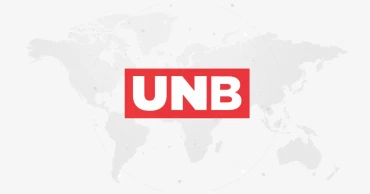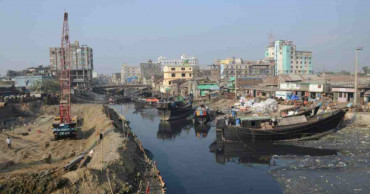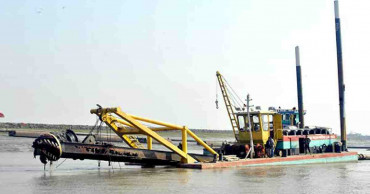canals
Integrated action plan to be adopted to save Dhaka canals: Adviser
Noting that Dhaka won’t be saved without protecting its rivers and canals Water Resources and Environment, Forests, and Climate Change Adviser Syeda Rizwana Hasan on Wednesday said integrated action plan will be taken to save canals of Dhaka.
"The actual picture of each canal in Dhaka needs to be identified. To protect Dhaka's rivers and canals, we must prepare an immediate, mid-term, and three-year roadmap and an integrated action plan," she said while presiding over a seminar titled “Blue Network Around Dhaka City” at a city hotel.
The adviser emphasised freeing several important canals in Dhaka from pollution initially.
She said the current generation of Dhaka has not seen any clean canals and emphasised the importance of involving all concerned, including the Ministry of Local Government, RAJUK, the City Corporation, in swiftly adopting programmes to free Dhaka's canals and rivers from pollution and encroachment.
Additionally, she urged those involved in the project to free Dhaka’s canals from pollution and encroachment to be cost-effective in its implementation.
Read: Excavation of 15 canals can solve 80% of waterlogging in Dhaka: Study
Adviser A.F. Hasan Ariff of the Ministry of Local Government, Rural Development, and Cooperatives, and Adviser Adilur Rahman Khan of the Ministry of Industry, Housing, and Public Works delivered speeches as distinguished guests.
At the beginning of the event, Chief Engineer of the Central Region of the Water Development Board, Md. Asaduzzaman, presented a PowerPoint on the current state of the rivers and canals around Dhaka, water drainage of Dhaka's canals, and the “Blue Network Around Dhaka City”.
Secretary of the Ministry of Water Resources Nazmul Ahsan and Director General of the Water Development Board Amirul Haque also spoke at the event.
Officials from various levels of the Ministry and the Water Development Board were present at the time, among others.
Read more: Govt unveils blue network plan for revival of Dhaka’s canals
1 year ago
Excavation of 15 canals can solve 80% of waterlogging in Dhaka: Study
Excavating only 15 encroached canals could resolve approximately 80% of Dhaka's persistent waterlogging problem, according to a recent study.
River and Delta Research Centre (RDRC), a non-government research organization, has recently conducted the study that identifies nine waterlogging-prone areas in the capital and offer solution to the ongoing problem.
The canals recommended for excavation include Rupnagar Main Khal, Baunia Khal, Baishteki Khal, Sangbadik Colony Khal, Kalyanpur Khal, Ibrahimpur Khal, Panthapath Box Culvert Khal, Rayerbazar Khal, Jirani Khal, the south end of Rampura Khal, Dolai Khal, Kadamtali Khal, and Manda Khal.
The study identified nine waterlogging hotspots: Pallabi Shiyalbari, Rupnagar, and Eastern Housing; Kalshi and Mirpur 11; Tolarbagh, Ahmed Nagar, and Paikpara; Shewrapara, Kazipara, and Kafrul; Kolabagan, Dhanmondi 27, Kathalbagan, Green Road, and Hatirpool; Hazaribagh, Nawabganj, Rayerbazar, West Dhanmondi, and Dhaka Newmarket; Rampura and Badda; Sutrapur, Wari, Nawabpur, Kazi Alauddin Road, Siddique Bazar, Narinda, and Tanti Bazar; and Jurain, Siddhirganj, Jaker Manjil, Shyampur, Purba Jurain, Saddam Market, and Rayerbag.
Incessant rains throw life out of gear in Dhaka
1 year ago
Mangrove reforestation to be initiated along 52 rivers and canals near Sundarbans
The Forest Department has undertaken a major initiative to restore mangrove forests along the banks of 52 rivers and canals near the Sundarbans in Khulna. This effort, inspired by the successful mangrove reforestation at Sheikh Russel Eco Park, aims to combat the impacts of climate change by planting native Sundarbans vegetation along these waterways.
In a model project at Sheikh Russel Eco Park in Batiaghata, mangrove reforestation was carried out on five acres of land along a lake, using saline water from the Rupsha River. This reforestation involved planting 4,000 mangrove saplings, setting a precedent for similar efforts in Khulna, Bagerhat, and Satkhira districts. The project, funded by the French Development Agency and implemented by IUCN Bangladesh and the Forest Department, will focus on restoring mangrove forests along 52 rivers and canals that flow through rural areas of Shyamnagar, Mongla, Dakop, Koyra, and Morelganj, eventually entering the Sundarbans.
‘Sundarbans Honey’ being registered as Bangladesh’s GI product: Industries Ministry
According to the Sundarbans West Division, this initiative is part of the ‘Upper Sundarbans Restoration Program,’ designed to enhance climate resilience in the region. The rivers and canals, once teeming with freshwater and vital to the Sundarbans’ mangrove ecosystem, have seen diminished water flow due to human activities such as deforestation, construction of embankments, and installation of sluice gates. These activities have led to the decline of mangrove forests along these waterways.
French President Emmanuel Macron’s visit to Bangladesh in September last year highlighted the French government's commitment to supporting climate-affected countries. Following his visit, the French Development Agency, with IUCN Bangladesh’s support, launched the ‘Upper Sundarbans Restoration Program’ to mitigate the impacts of climate change on the Sundarbans and surrounding rural areas.
Dr. Abu Naser Mohsin Hossain, Divisional Officer of the Sundarbans West Forest Division, said that from July 6 to 8, officials from the Forest Department, French Development Agency, and IUCN Bangladesh will jointly visit the cyclone-affected settlements in the upper Sundarbans and the mangrove model at Sheikh Russel Eco Park. This visit will lead to the launch of a pilot project aimed at restoring the mangrove forests along the banks of the region’s rivers and canals.
Read more: Three-month ban in Sundarbans worries local communities
1 year ago
Dev projects must not damage rivers and canals: PM Hasina asks officials
Prime Minister Sheikh Hasina on Monday (October 16, 2023) asked the officials concerned to make sure that developments projects don’t impede the free flow of water bodies, including rivers and canals.
“We have to ensure the uninterrupted flow of rivers. Keeping that in mind, we have to carry out our projects and development activities,” she said.
The prime minister said this while inaugurating various projects under the ministries of water resources and health.
She joined the programme from her official residence, Ganabhaban, through video link.
She said that in the name of development it is often seen that all water bodies are filled up.
“I think that this is very fulsome. All have to take step to save the water resources whenever any project is taken up or implemented,” she stressed.
Hasina also put importance on preserving water during the monsoon season.
She put emphasis on continuous capital dredging and maintenance dredging whichever is needed for the water bodies.
Read more: Bangladesh is a role model to least development countries: Shahab Uddin
The PM also said that the natural flow of the rivers, canals, beels (lake-like wetland) and other water bodies must not be hindered during implementation of any development project.
She asked the relevant authorities to ensure having at least one water reservoir in every development project.
Mentioning water as the biggest resource for the country, she said that all water bodies must have to be protected.
“The nature will flow by its own course, and we have to take steps to save our resources going with that flow,” she said.
Read more: Development should prioritise environmental protection over environmental damage: Dr Hossain Zillur
Health and Family Welfare Minister Zahid Maleque and State Minister for Water Resources Ministry Zaheed Farooque also spoke at the programme.
2 years ago
Re-excavation of canals giving new hope to Cumilla residents
Residents of Chandina upazila and Chouddagram upazila of Cumilla district are dreaming of a new beginning as the re-excavation work of Kazipara canal and Kanail canal is going on in full swing under the supervision of Bangladesh Agriculture Development Corporation (BADC).
According to the local farmers and BADC, the authorities concerned will excavate the 3.5 kilometer area of Kazipara canal and 4-km area of Kanail canal.
After the re-excavation work, the crops of 3000 acres of land along the two canals will be protected after removing waterlogging problem during monsoon.
READ: Demarcation of 29 canals started in city
2000 farmers will be benefitted by the re-excavation of the canals as they will irrigate their crops land by the water of the canals during dry season.
During a recent visit at Barera in Chandina upazila along Kazipara canal, this correspondent found that many crops land turned into fallen land due to lack of irrigation.
4 years ago
Demarcation of 29 canals started in city
All illegal establishments will be evicted from the canals in the city following the demarcation of the waterbodies, said LGRD and Cooperatives Minister Md Tazul Islam on Wednesday.
He said this while addressing the inauguration function of the demarcation process of 29 canals and one regulatory pond under Dhaka North City Corporation (DNCC). The event was arranged in the city’s Kalyanpur Regulatory Pond area.
Read: How the life was sucked out of the Suvadda Canal
The Minister praised Dhaka's two city corporations for starting the process to free canals from illegal occupants and evict illegal structures from the water channels after the Dhaka WASA handed over the responsibility of the canals to them.
He said the government acquired 173 acres of land in Kalyanpur to construct a water regulatory pond in a bid to ease the Dhaka city’s waterlogging.
But the entire land except three acres went under the illegal land grabbers and different structures were constructed on the acquired land, he said.
“The normal water flow will be ensured by removing all establishments inside the land after the demarcation,” said the Minister.
He said many canals including Ramchandrapur have already been freed from the illegal occupations. In collaboration with the administration, the public representatives have evicted various illegal establishments by engaging common people in it, he said.
Read: Atiqul renews his vow: All canals under DNCC to be recovered
Tazul said the public support is required to bring back the heritage of Dhaka by reviving the old canals.
He sought the cooperation from media in garnering public support, said a PID handout.
DNCC Mayor Md Atiqul Islam also spoke on the occasion, while DNCC ward councilors and senior officials were present.
4 years ago
Experts seek master plan for sustainable river dredging
Experts at a webinar on Saturday urged the government to prepare a master plan for ensuring sustainable river and canal dredging and their management in a bid to accelerate further economic advancement of the riverine country.
They also said the number of rivers in Bangladesh is declining due to siltation and fall in streamflow affecting waterways that are the cheapest means of transportation.
Under the circumstances, the experts called upon the government to make an adequate allocation for river dreading and proper river training.
Also read: Capital dredging project: First phase set to miss deadline
Dhaka Chamber of Commerce & Industry (DCCI) arranged the webinar titled ‘Sustainable River Dredging: Challenges and Way Forward'.
Water expert and Brac University Professor Emeritus Ainun Nishat presented the keynote paper at the programme while State Minister for Shipping Khalid Mahmud Chowdhury joined it as the chief guest.
Dr Nishat said there are two types of dredging like maintenance dredging and capital dredging. “A master plan should be prepared for river and canal dredging in Bangladesh.”
He said dredging should be done in a sustainable manner so that the economy can be benefited as rivers not only carry water but also carry lives. “For an efficient river management, special emphasis must be put on maintenance dredging.”
Stating that the private sector can play a major role in dredging operation, the water expert said also underscored the importance of investments in dredging and de-siltation works. “Private dredging operators must be trained on sustainability issues. PPP can be a useful model for river dredging, sand extraction, land recovery, land accretion and land reclamation.”
Also read: Kaladumur River dying; immediate dredging needed
Dr Nishat said the current practice of dredging operations, both capital and maintenance, need to be evaluated urgently. “Rules and guidelines for sand dredging from river beds should be updated and followed strictly.”
He suggested establishing a river training institute to create skilled manpower for river management.
Institute of Water Modelling (IWM) Executive Director Abu Saleh Khan said the total river basin system should be analysed in an efficient manner. “Dredgers are now ultramodern and highly efficient but they need proper training for skill development and capacity building.”
He also focused on sustainable dredging and long-term strategic planning in the maritime sector. “For sustainable dredging, dredgers have to have the idea on soil condition, river system, stream nature and ecological system. There should have been a post-dredging evaluation system in the policy.”
State Minister for Shipping Khalid Mahmud Chowdhury said the government has been working sincerely to ensure effective river management as per its delta plan. “We’ve a plan to make 10,000 km inland river ways navigable.”
He said the capacity of Mongla Port has now increased manifolds, easing the pressure on Chittagong port. “We’ve limitations and challenges but we must have to manage our rivers through efficient dredging as these’re our natural assets.”
The junior minister said the government has been working on sustainable river dredging both in the form of capital dredging and maintenance dredging and 35 more dredgers will be procured soon.”
As per the delta plan, he said, the government is firmly committed to developing the riverine system in the country. “We invited the private sector to come forward with more investments, even in the PPP format, to materialize the delta plan.”
DCCI President Rizwan Rahman said waterways play a diverse role in the economy of Bangladesh as it is a riverine country.
“It’s a high time to improve the waterways for the sake of both industrial and socioeconomic development of the country as Bangladesh is poised to become a developing country by 2026. The 24,000 km of waterways come down to 6,000 km in monsoon and 3,600 km during the lean period due to dynamic characteristics of the rivers and its effect falls into the economic and ecological state of the country,” he observed.
He said navigable waterways have manifold positive cascading effects on the economy as it saves container movement time and ensures comparatively cheaper goods transportation system. “Navigable and well-managed waterways help ease cross-border trade growth with the neighbouring states. But lack of maintenance, weakening upstream flow and human interventions are some of the common problems for declining navigable waterways.”
4 years ago
Preserving biodiversity: Govt plans to revive small rivers, canals, wetlands
The government has taken a massive plan to recover canals, wetlands and small rivers across the country and re-excavate those to increase their navigability and water reservation capacity, groundwater recharge and thus preserve the biodiversity.
5 years ago




.jpg)


.jpg)





